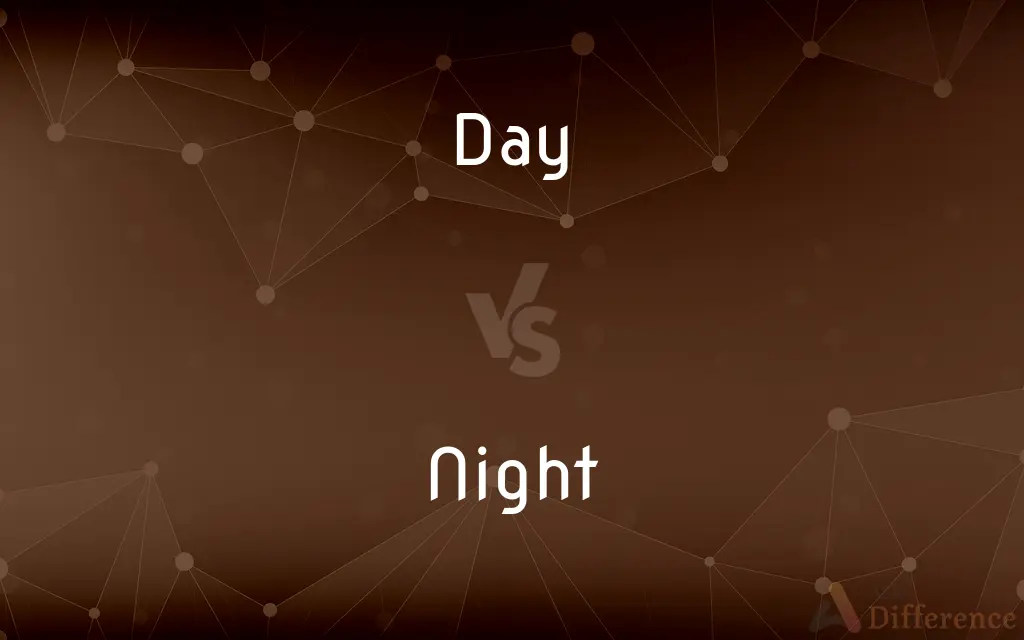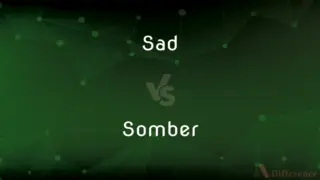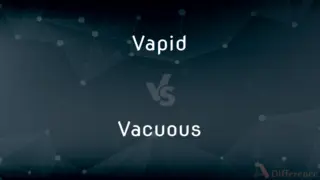Day vs. Night — What's the Difference?
By Tayyaba Rehman — Updated on September 18, 2023
Drama is a genre or type of performance characterized by conflict and emotion; Play is a specific written work by a playwright, designed for theatrical presentation.

Difference Between Day and Night
Table of Contents
ADVERTISEMENT
Key Differences
Drama and Play often intersect in the world of theater. Drama is a broader term encompassing a genre of storytelling with emotional arcs and conflicts. In contrast, a Play refers to the written script of such a story, designed to be performed by actors on a stage.
A Drama is not limited to the theater; it can exist in various mediums like television, movies, radio, and literature. Meanwhile, a Play is inherently designed for theatrical performances, dictating actions, dialogues, and stage directions for performers.
When someone speaks of Drama, they refer to a type of narrative that emphasizes emotional development and conflict. On the other hand, when discussing a Play, they talk about the structured and written rendition of such a story, meant for performance.
While a Drama is about bringing stories alive with emotion and tension, a Play provides the blueprint for how this can be achieved on stage. The Play is the vessel, while the Drama is the substance within.
Every Play can contain Drama, but not all Drama takes the form of a Play. Drama can be a part of various mediums, while a Play specifically refers to the theatrical representation of stories.
ADVERTISEMENT
Comparison Chart
Definition
Genre emphasizing conflict and emotion.
Scripted work meant for theatrical performance.
Medium
Can exist in TV, movies, radio, literature.
Specifically for theater.
Nature
The substance or essence of emotional storytelling.
The structure or blueprint for theatrical storytelling.
Written Form
Not always written; can be impromptu.
Always written, with directions for performance.
Performance
Can be performed or simply read/watched.
Meant to be performed on stage.
Compare with Definitions
Day
The 24-hour period during which the earth completes one rotation on its axis, traditionally measured from midnight to midnight.
Night
The period between sunset and sunrise, especially the hours of darkness.
Day
A day is approximately the period during which the Earth completes one rotation around its axis, which takes around 24 hours. A solar day is the length of time which elapses between the Sun reaching its highest point in the sky two consecutive times.
Night
This period considered as a unit of time
For two nights running.
Day
The period of light between dawn and nightfall; the interval from sunrise to sunset.
Night
Night (also described as night time or night-time or nighttime, unconventionally spelled as nite) is the period of ambient darkness from sunset to sunrise during each 24-hour day, when the Sun is below the horizon. The exact time when night begins and ends depends on the location and varies throughout the year, based on factors such as season and latitude.
Day
The period during which a celestial body makes a similar rotation.
Night
Directions and dialogues for theatrical performance.
The director adjusted certain scenes in the play for better impact.
Day
A situation involving intense conflict or emotion.
There was so much drama at the party last night.
Night
A piece presented in a theater or broadcast for radio.
The radio station aired a mystery play every week.
Day
One of the numbered 24-hour periods into which a week, month, or year is divided.
Night
This period considered from its conditions
A rainy night.
Day
The portion of a 24-hour period that is devoted to work, school, or business
An eight-hour day.
A sale that lasted for three days.
Night
The period between dusk and midnight of a given day
Either late Thursday night or early Friday morning.
Day
A 24-hour period or a portion of it that is reserved for a certain activity
A day of rest.
Night
The period between evening and bedtime.
Day
A specific, characteristic period in one's lifetime
In Grandmother's day, skirts were long.
Night
This period considered from its activities
A night at the opera.
Day
A period of opportunity or prominence
Every defendant is entitled to a day in court. That child will have her day.
Night
This period set aside for a specific purpose
Parents' Night at school.
Day
A period of time in history; an era
We studied the tactics used in Napoleon's day. The day of computer science is well upon us.
Night
The period between bedtime and morning
Spent the night at a motel.
Day
Days Period of life or activity
The sick cat's days will soon be over.
Night
One's sleep during this period
Had a restless night.
Day
Of or relating to the day.
Night
Nightfall
Worked from morning to night.
Day
Working during the day
The day nurse.
Night
Darkness
Vanished into the night.
Day
Occurring before nightfall
A day hike.
Night
A time or condition of gloom, obscurity, ignorance, or despair
"In a real dark night of the soul it is always three o'clock in the morning" (F. Scott Fitzgerald).
Day
Any period of 24 hours.
I've been here for two days and a bit.
Night
A time or condition marked by absence of moral or ethical values
"He never would have let us go untroubled into the night of private greed" (Anthony Lewis).
Day
A 24-hour period beginning at 6am or sunrise.
Your 8am forecast: The high for the day will be 30 and the low, before dawn, will be 10.
Night
Of or relating to the night
The night air.
Day
A period from midnight to the following midnight.
The day begins at midnight.
Night
Intended for use at night
A night light.
Day
(astronomy) Rotational period of a planet (especially Earth).
A day on Mars is slightly over 24 hours.
Night
Working during the night
The night nurse.
Day
The part of a day period which one spends at one’s job, school, etc.
I worked two days last week.
Night
Active chiefly at night
Night prowlers.
Day
Part of a day period between sunrise and sunset where one enjoys daylight; daytime.
Day and night;
I work at night and sleep during the day.
Night
Occurring after dark
Night baseball.
Day
A specified time or period; time, considered with reference to the existence or prominence of a person or thing; age; time; era#Noun.
Every dog has its day;
In that day;
Back in the day;
In those days
Night
(countable) The period between sunset and sunrise, when a location faces far away from the sun, thus when the sky is dark.
How do you sleep at night when you attack your kids like that!?
Day
A period of contention of a day or less.
The day belonged to the Allies.
Night
The period of darkness beginning at the end of evening astronomical twilight when the sun is 18 degrees below the horizon, and ending at the beginning of morning astronomical twilight.
Day
(Judaism) A time period from a nightfall until the following nightfall
Night
A period of time often defined in the legal system as beginning 30 minutes after sunset, and ending 30 minutes before sunrise.
Day
To spend a day (in a place).
Night
(countable) An evening or night spent at a particular activity.
A night on the town
Day
The time of light, or interval between one night and the next; the time between sunrise and sunset, or from dawn to darkness; hence, the light; sunshine; - also called daytime.
Night
(countable) A night (and part of the days before and after it) spent in a place away from home, e.g. a hotel.
I stayed my friend's house for three nights.
Day
The period of the earth's revolution on its axis. - ordinarily divided into twenty-four hours. It is measured by the interval between two successive transits of a celestial body over the same meridian, and takes a specific name from that of the body. Thus, if this is the sun, the day (the interval between two successive transits of the sun's center over the same meridian) is called a solar day; if it is a star, a sidereal day; if it is the moon, a lunar day. See Civil day, Sidereal day, below.
Night
(uncountable) Nightfall.
From noon till night
Day
Those hours, or the daily recurring period, allotted by usage or law for work.
Night
(uncountable) Darkness (due to it being nighttime).
The cat disappeared into the night.
Day
A specified time or period; time, considered with reference to the existence or prominence of a person or thing; age; time.
A man who was great among the Hellenes of his day.
If my debtors do not keep their day, . . . I must with patience all the terms attend.
Night
(uncountable) A dark blue colour, midnight blue.
Day
Preceded by the) Some day in particular, as some day of contest, some anniversary, etc.
The field of Agincourt,Fought on the day of Crispin Crispianus.
His name struck fear, his conduct won the day.
Night
A night's worth of competitions, generally one game.
Day
Time for Earth to make a complete rotation on its axis;
Two days later they left
They put on two performances every day
There are 30,000 passengers per day
Night
Ellipsis of good night
Night, y'all! Thanks for a great evening!
Day
Some point or period in time;
It should arrive any day now
After that day she never trusted him again
Those were the days
These days it is not unusual
Night
To spend a night (in a place), to overnight.
Day
The time after sunrise and before sunset while it is light outside;
The dawn turned night into day
It is easier to make the repairs in the daytime
Night
That part of the natural day when the sun is beneath the horizon, or the time from sunset to sunrise; esp., the time between dusk and dawn, when there is no light of the sun, but only moonlight, starlight, or artificial light.
And God called the light Day, and the darkness he called Night.
Day
A day assigned to a particular purpose or observance;
Mother's Day
Night
Darkness; obscurity; concealment.
Nature and nature's laws lay hid in night.
Day
The recurring hours when you are not sleeping (especially those when you are working);
My day began early this morning
It was a busy day on the stock exchange
She called it a day and went to bed
Night
Intellectual and moral darkness; ignorance.
She closed her eyes in everlasting night.
Do not go gentle into that good nightRage, rage against the dying of the light.
Day
An era of existence or influence;
In the day of the dinosaurs
In the days of the Roman Empire
In the days of sailing ships
He was a successful pianist in his day
Night
A lifeless or unenlivened period, as when nature seems to sleep.
So help me God, as I have watched the night,Ay, night by night, in studying good for England.
Day
A period of opportunity;
He deserves his day in court
Every dog has his day
Night
The time after sunset and before sunrise while it is dark outside
Day
The period of time taken by a particular planet (e.g. Mars) to make a complete rotation on its axis;
How long is a day on Jupiter?
Night
The time between sunset and midnight;
He watched television every night
Day
The time for one complete rotation of the earth relative to a particular star, about 4 minutes shorter than a mean solar day
Night
The period spent sleeping;
I had a restless night
Day
United States writer best known for his autobiographical works (1874-1935)
Night
The dark part of the diurnal cycle considered a time unit;
Three nights later he collapsed
Day
A narrative emphasizing conflict and emotion.
The movie was a gripping drama about love and loss.
Night
Darkness;
It vanished into the night
Day
Storytelling that captures human experiences.
The drama of the situation captivated everyone's attention.
Night
A shortening of nightfall;
They worked from morning to night
Day
Genre found in TV, film, radio, and literature.
She prefers drama series over comedies on television.
Night
A period of ignorance or backwardness or gloom
Day
Expressing or dealing with profound emotions.
The drama in the final scene was palpable.
Night
Roman goddess of night; daughter of Erebus; counterpart of Greek Nyx
Night
A written theatrical composition.
Shakespeare's 'Macbeth' is a classic play.
Night
The act of performing a drama on stage.
The play was a hit, with nightly standing ovations.
Night
A structured narrative meant for actors.
The playwright spent months perfecting his play.
Common Curiosities
Can a movie be considered a play?
No, a movie is a film, but it can have drama as a genre.
What's the main difference between drama and play?
Drama is a genre; play is a scripted work for theatrical presentation.
Can a drama exist outside of theater?
Yes, drama can be in movies, TV shows, and even in real-life situations.
Do all plays get performed?
No, some plays are written but never performed on stage.
What's more specific, drama or play?
Play is more specific, referring to a scripted theatrical work.
Are all plays dramas?
No, plays can be comedies, tragedies, histories, or dramas.
Is drama always scripted?
No, drama can be impromptu, but plays are always scripted.
Who writes plays?
Playwrights write plays.
How long is a typical play?
Play lengths vary, from short 10-minute plays to multi-hour epics.
Can a comedy be a drama?
While they're different genres, a piece can have elements of both.
Can a drama be a musical?
Yes, musicals can be dramas if they emphasize conflict and emotion.
Is drama always serious?
No, drama emphasizes emotion and conflict, but it can have light moments.
Are all plays meant for large theaters?
No, plays can be designed for any venue, from large theaters to small rooms.
Can one actor perform a play?
Yes, there are one-person plays known as monologues or solo performances.
What's the key element in drama?
Conflict and emotional development are key in drama.
Share Your Discovery

Previous Comparison
Sad vs. Somber
Next Comparison
Vapid vs. VacuousAuthor Spotlight
Written by
Tayyaba RehmanTayyaba Rehman is a distinguished writer, currently serving as a primary contributor to askdifference.com. As a researcher in semantics and etymology, Tayyaba's passion for the complexity of languages and their distinctions has found a perfect home on the platform. Tayyaba delves into the intricacies of language, distinguishing between commonly confused words and phrases, thereby providing clarity for readers worldwide.
















































